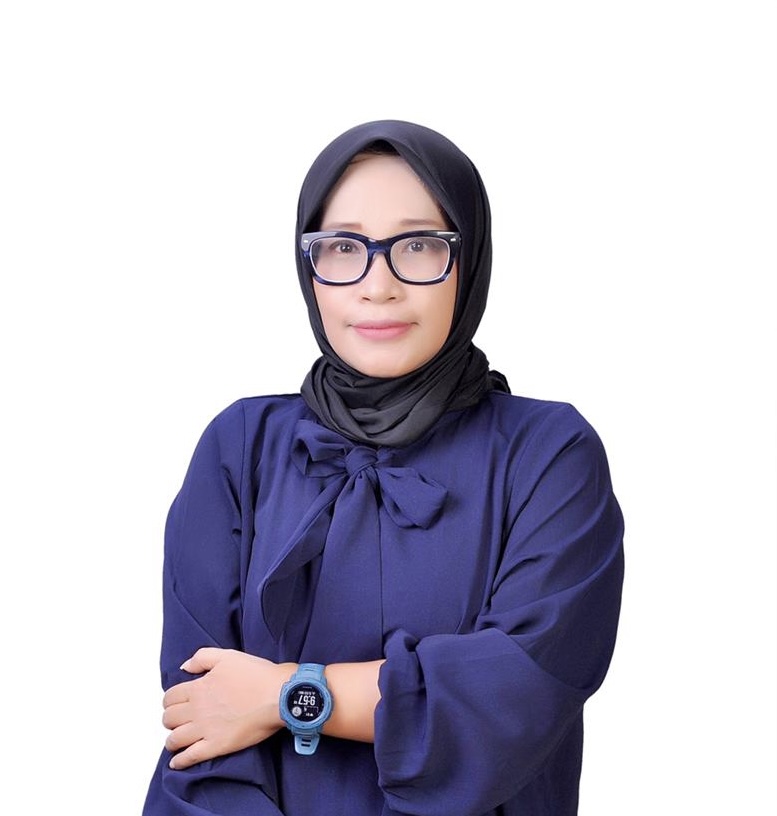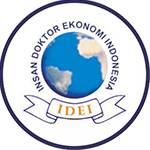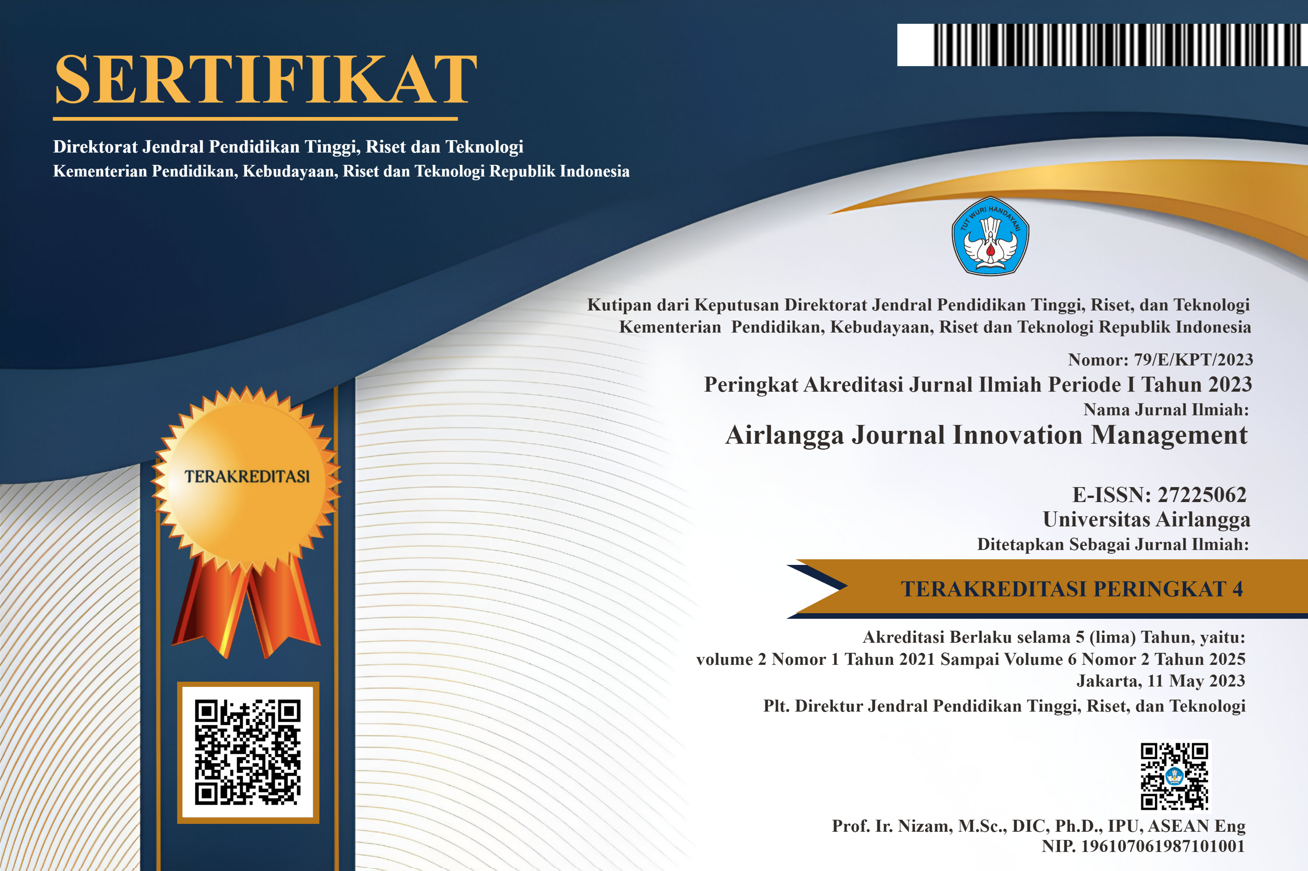Bahasa Inggris
Unduhan
Di era globalisasi, perkembangan tren ekonomi dan literasi mengalami pertumbuhan yang sangat cepat. Tren ekonomi halal dan industri halal juga mengalami kemajuan pesat seiring dengan meningkatnya jumlah konsumen halal di seluruh dunia. Pengaruh tren halal ini terlihat dalam preferensi generasi Z terhadap kosmetik yang memiliki label halal, menunjukkan kesadaran mereka terhadap kehalalan produk kosmetik. Oleh karena itu, penting untuk melakukan penelitian guna memahami faktor-faktor yang mempengaruhi kesadaran dan preferensi generasi Z terhadap kosmetik berlabel halal di Bogor. Penelitian ini menggunakan metode kuantitatif dengan menggunakan kuesioner dan menerapkan teknik purposive sampling dalam pengambilan sampel. Penelitian kuantitatif ini melibatkan 103 responden dan menerapkan metode Partial Least Square-Structural Equation Modeling (PLS-SEM) dengan bantuan perangkat lunak Smart-PLS 3.0. Variabelnya meliputi kontrol perilaku, norma subjektif dan sikap. Temuan dari penelitian ini adalah dari ketiga variable tersebut semuanya berpengaruh positif signifikan terhadap minat beli kosmetik berlabel halal pada gen z di Bogor.
Kata kunci: Kontrol Perilaku, Norma Subjektif, Sikap, Kosmetik Halal
Adinata, K. J., & Yasa, N. N. K. (2018). PENGARUH KEPERCAYAAN, PERSEPSI HARGA, DAN SIKAP TERHADAP NIAT BELI KEMBALI DI SITUS LAZADA. 7(8), 4153–4180.
Amelia, E., & Hurriyati, R. (2022). The effect Pf Perceived Usefullness and Perceived Ease of Use on Interest in Using Mobile Payment : A Case on OVO. Airlangga Journal of Innovation Management, 3(2), 123–135.
Aryadhe, T., Suryani, A., & Sudiksa, I. B. (2018). PENGARUH SIKAP DAN NORMA SUBJEKTIF TERHADAP NIAT BELI DAN KEPUTUSAN PEMBELIAN. 7(3), 1452–1480.
Chaulagain, S., Pizam, A., & Wang, Y. (2021). An Integrated Behavioral Model for Medical Tourism: An American Perspective. Journal of Travel Research, 60(4), 761–778. https://doi.org/10.1177/0047287520907681
Febriyanti, A. R., Ratnasari, R. T., & Wardhana, A. K. (2022). The Effect of Economic Growth, Agricultural Land, and Trade Openness Moderated By Population Density on Deforestation in OIC Countries. Quantitative Economics and Management Studies, 3(2).
Ghifara, A. S., Iman, A. N., Wardhana, A. K., Rusgianto, S., & Ratnasari, R. T. (2022). The Effect of Economic Growth, Government Spending, and Human Development Index toward Inequality of Income Distribution in the Metropolitan Cities in Indonesia. Daengku: Journal of Humanities and Social Sciences Innovation, 2(4), 529–536.
Hagger, A., Martin, S., & Mike, W. (2022). Perceived Behavioral Control Moderating Effects in the Theory of Planned Behavior: A Meta-Analysis. 41, 155–167. https://doi.org/10.1037/hea0001153
Hasniati, Indriasari, D. P., & Sirajuddin, A. (2021). Pengaruh Customer Experience terhadap Repurchase Intention Produk Online dengan Customer Satisfaction sebagai Variable Intervening. 1(2), 11–23.
Iman, A. N., Wardhana, A. K., Rusgianto, S., & Ratnasari, R. T. (2022). Venture vs Investment, Which Type of Financing was more Demanded by Agriculture, Forestry, and Aquaculture Sector? Daengku: Journal of Humanities and Social Sciences Innovation, 2(5), 587–595.
Irzal, T., & Suparno. (2017). PENGARUH PENERAPAN SISTEM INFORMASI AKUNTANSI , SISTEM TERHADAP KUALITAS LAPORAN KEUANGAN SATUAN KERJA PERANGKAT. 2(4), 125–135.
Ishak, S., Che Omar, A. R., Khalid, K., Intan, I. S., & Hussain, M. Y. (2019). Cosmetics purchase behavior of educated millennial Muslim females. Journal of Islamic Marketing. https://doi.org/10.1108/JIMA-01-2019-0014
Juliansyah, A. F., Putri, A. E., Suryadana, M. L., Endyana, C., & Wardhana, A. K. (2021). Global Muslim Response to Bandung Halal Tourism Branding. International Journal of Applied Sciences in Tourism and Events, 5(2), 197–206. https://doi.org/https://doi.org/https://doi.org/10.31940/ijaste.v5i2.197-206
Khan, A., Arafat, M. Y., & Azam, M. K. (2022). Role of halal literacy and religiosity in buying intention of halal branded food products in India. Journal of Islamic Marketing, 13(2), 287–308.
Loestefani, V., Poan, R., Suwitorahardjo, B., & Wardhana, A. K. (2022). Service Quality and Product Quality as An Influence on Customer Loyalty at Naturalis Koffie. FIRM Journal of Management Studies, 7(2), 211–236.
Mafruchati, M., Wardhana, A. K., & Ismail, W. I. W. (2022). Disease and viruses as negative factor prohibiting the growth of broiler chicken embryo as research topic trend: a bibliometric review. F1000Research, 11(1124), 1124.
Ningtyas, Y., Fitria, D., Pradani, Y. S., Mutohar, Arum, N. P., & Maknun, L. (2021). Analisis pengaruh sikap, norma subjektif, dan persepsi kontrol perilaku terhadap minat beli konsumen pada produk bersertifikat halal. 2(08), 42–49.
Nofri, O., & Hafifah, A. (2018). ONLINE SHOPPING DI KOTA MAKASSAR. 5(1), 113–132.
Pratiwi, A. C., Wardhana, A. K., & Rusgianto, S. (2022). Application of Vector Error Correction Model on Macroeconomic Variables toward Changes in the Composite Stock Price Index. Daengku: Journal of Humanities and Social Sciences Innovation, 2(2), 219–229.
Priantina, A., & Sapian, M. (2023). SERTIFIKASI HALAL DI INDONESIA Dari Voluntary Menjadi Mandatory. 2(1), 95–118.
Qosim, N., Ratnasari, R. T., Wardhana, A. K., Fauziana, H., & Barkah, T. T. (2023). Eight Years of Research Related to the Green Sukuk in the Global Stock Exchange Market to Support the Implementation of SDG: A Bibliometric Review. Journal of Islamic Economic and Business Research, 3(2), 161–180.
Rachbini, W. (2018). The Relationship of Attitude , Subjective Norm , Perceived Behavioral Control on Halal Food Purchasing Behavior in Jakarta. 20(1), 28–37. https://doi.org/10.9790/487X-2001082837
Rumondang, A., Sudirman, A., Sitorus, S., Halim, A., Kusuma, P., Manuhutu, M., Sudarso, A., Simarmata, J., Hasdiana, D., Arif, N. F., Yayasan, P., & Menulis, K. (2020). Pemasaran Digital dan Perilaku Konsumen.
Russo, D., & Stol, K. (2021). PLS-SEM for Software Engineering Research : An. 54(4). https://doi.org/10.1145/3447580
Ryandono, M. N. H., Mawardi, I., Rani, L. N., Widiastuti, T., Ratnasari, R. T., & Wardhana, A. K. (2022). Trends of research topics related to Halal meat as a commodity between Scopus and Web of Science: A systematic review. F1000Research, 11(1562), 1562.
Ryandono, M. N. H., Permatasari, S. A., & Wijayanti, I. (2019). Business behavior in an islamic perspective: Case study of muslim woman entrepreneurs in Ikatan Wanita Pengusaha Indonesia (IWAPI). 12th International Conference on Business and Management Research (ICBMR 2018), 154–159.
Ryandono, M. N. H., Wijayanti, I., & Kusuma, K. A. (2020). Determinants of Investment In Islamic Crowdfunding. Muqtasid: Jurnal Ekonomi Dan Perbankan Syariah, 11(1), 70–87.
Safitri, E. A. (2022). Pengaruh Sikap, Norma Subyektif, Kontrol Perilaku, Dan Label Halal Terhadap Intensi Pembelian Produk Kosmetik (Studi Kasus Mahasiswa Perguruan Tinggi Agama Islam Di Purwokerto).
Samsul, Muslimin, S., & Jafar, W. (2022). Journal of Islamic Economics Peluang dan Tantangan Industri Halal Indonesia Menuju Pusat Industri Halal Dunia. 4, 12–24. https://doi.org/10.37146/ajie
Santoso, T. B., & Kusuma, A. (2023). The Development of the Usage of Blockchain for Waqf and Zakat Globally: A Bibliometric Study. International Journal of Mechanical Computational and Manufacturing Research, 13(3), 83–91.
Shahid, S., Ahmed, F., & Hasan, U. (2018). A qualitative investigation into consumption of halal cosmetic products: the evidence from India. Journal of Islamic Marketing, 9(3), 484–503. https://doi.org/10.1108/JIMA-01-2017-0009
Standard, D. (2020). State of the Global Islamic Economy Report.
State of the Global Islamic Economy Report. (2023). State of the Global Islamic Economy Report. In DinarStandard.
Sungkar, I., Regional, D. H.-T. W. B. F. E., & 2009, undefined. (n.d.). The global halal food market and updates on global halal standards. Alhudacibe.Com. Retrieved October 11, 2021, from https://alhudacibe.com/Halalrc/images/Research Material/Presentations/THE GLOBAL HALAL FOOD MARKET AND UPDATES ON GLOBAL HALAL STANDARDS.pdf
Wardhana, A. K. (2021). The Application of Waqf and Endowment Fund Based on the Principles in the Sharia Maqashid Pillar Society. Prosperity: Journal of Society and Empowerment, 1(2), 107–119. https://doi.org/10.21580/prosperity.2021.1.2.8829
Zaki, I., Herianingrum, S., Hapsari, M. I., Bayuny, A. F. R., & Wijayanti, I. (2024). Diversifikasi Pengolahan Frozen Nugget, Pengemasan dan Pemasaran Google Bisnis. JILPI: Jurnal Ilmiah Pengabdian Dan Inovasi, 2(3), 1–10.
Zakik, Z., Kamil, A., Prasetyo, A. S., Ryandono, M. N. H., & Wijayanti, I. (2022). Economic development on Madura Island through halal tourism: A business feasibility study. Al-Uqud: Journal of Islamic Economics, 6(2), 289–303.
Zulaikha, S., Hendratmi, A., Sridadi, A. R., Basit, A., Iman, A. N., Wardhana, A. K., Ghifara, A. S., Pratiwi, A. C., Febriyanti, A. R., & Nugroho, A. D. (n.d.). FILSAFAT EKONOMI ISLAM Menjawab Tantangan Peradaban. Zifatama Jawara.
Hak Cipta (c) 2024 Airlangga Journal of Innovation Management

Artikel ini berlisensiCreative Commons Attribution-NonCommercial-ShareAlike 4.0 International License.
- The journal allows authors to hold copyright without restrictions and retain publication rights without restrictions. The author retains the copyright and grants the first publication rights to the journal, with his work simultaneously licensed under the Creative Commons Attribution-NonCommercial-ShareAlike 4.0 International License (CC BY-NC-SA). This license allows others to share the work with acknowledgment of authorship and initial publication in this journal, provided that the work is not used for commercial purposes and that any derivative works must use the same license.
- Authors may enter into additional contractual agreements for non-exclusive distribution of the journal publication version (e.g., uploading it to an institutional repository or publishing it in book form), while still including acknowledgment of the initial publication in this journal.
- Authors are allowed and encouraged to upload their work online (e.g., in an institutional repository or personal website) before and during the submission process. This can support productive scientific exchanges as well as increase citations to published works.

AJIM by UNAIR is licensed under a Creative Commons Attribution-NonCommercial-ShareAlike 4.0 International License.





















